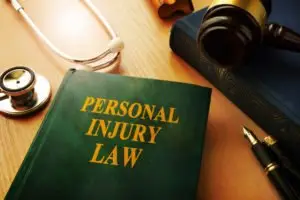
Personal injury is the event in which harm is caused to the body, emotions, or mental health, but not property damage. Pain and suffering damages can be claimed in personal injury cases. This can be done through the insurance company of the involved parties, or filed by the victim or a personal representative, typically a personal injury lawyer, in civil court. Florida is a no-fault state, which means civil courts will almost always deny car accident claims and forego responsibility to insurance companies. Some claims may not require a lawyer at all.
In order to determine whether or not you need to hire a lawyer for your personal injury claim, we at The Law Place always recommend seeking legal advice with a qualified personal injury attorney. We offer a free consultation with no obligation to ensure that you know your options and can proceed confidently with your personal injury case. If it is determined that you have a legitimate claim in civil court or that settlement is in your best interest, we can provide a team of experienced and qualified attorneys to aid you in your legal battle or settlement.
All of our attorneys work together on every case. We guarantee a thorough and experienced approach to all personal injury claims and can help lighten the load during your trying time. The Law Place works on a contingency fee basis, meaning we don’t get paid unless you do. Our pay structure will be outlined in your consultation, so there are no surprise fees or costs.
Call our law firm today to schedule your free consultation on (941) 444-4444.
How Do I Deal With a Personal Injury Claim Without a Lawyer?
Firstly, a personal injury must be medically proven to have occurred. You should seek medical attention and keep a log of all wounds sustained in the incident. Take pictures of the injuries as well. In claims court, you have a responsibility to mitigate any costs associated with your injuries, and a doctor’s record of treatment will play in your favor. If it is found that your injuries compounded because you didn’t seek medical attention, you may not have a claim to those damages. Also, your minor injury could evolve into a major one. That little case of whiplash could turn into a slipped disk, and if you settle before that happens, you might not have a claim to further compensation.
The next step is to file a report with your insurance company. No-fault laws mean that insurance companies deal with auto accident claims unless a catastrophic or serious injury is sustained. In the case of death, a wrongful death claim may include personal injury in the damages you may be entitled to. Insurance companies will send out investigators to prove legitimacy and collect evidence. The company will negotiate with the other party’s insurance to determine what sort of compensation you are entitled to. Without insurance, especially car insurance, a Florida personal injury case become extremely difficult to pursue. Make sure you are covered to prevent these sorts of complications from happening.
Health insurance or personal injury coverage will typically alleviate some of the associated costs and may negate the legal justification for a civil claim. It is important to record any serious or catastrophic injuries that you may have sustained and report them to your auto or health insurance provider. According to Florida Statute 316.027, serious injury is a personal condition that creates a substantial risk for death, permanent or significant scarring or disfigurement, or the loss of bodily function or mobility.
If talks with insurance companies fail and you are unable to reach a settlement, you may determine your best course of action is filing suit in civil court to claim your damages. You can pursue this matter without an attorney, filing all the paperwork necessary on your own behalf or for your loved one as their personal representative. However, the claims process is complex and time-consuming. There are a plethora of laws that you are not expected to know of. It is in your best interest to consult with an attorney if you decide to go to court. The Law Place has an experienced team who can help you navigate the process of a civil court claim and help alleviate the associated burden of this filing. Especially if you are experiencing pain and suffering, it is highly advisable to let an attorney do the talking for you.

Can I Get a Settlement Without a Lawyer?
As stated above, it is entirely possible to settle a personal injury claim without a lawyer. Insurance companies can negotiate on your behalf in talks with the opposing party and may find a settlement that you are happy with. In auto accident cases, this is typically what happens. You can also negotiate a settlement with the party directly, although this is not advisable as you may settle for a severely underestimated sum.
Small claims can definitely be dealt with without a lawyer. Pain and suffering caused by minor injury are usually covered by small claims. According to the Florida Courts, small claims are considered to be totaling under $8,000, not including court costs and lawyer’s fees. Anything above that would be considered a large claim. Most small claims are settled out of court by insurance companies or through arbitration, and the associated costs are much less in comparison to a large claim.
However, if you fail to negotiate an adequate settlement with your insurance, you may want to pursue legal action. It is always beneficial to have a lawyer on your side. An experienced personal injury attorneys in Sarasota may obtain a higher sum and claim damages you didn’t think of. When dealing with the opposing insurance company, an insurance adjuster will do everything in their power to reduce the settlement available to you, including discrediting your claim and even pursuing damages against you. Having good legal representation ensures protection against an insurance company with only their interests at heart.
 We’re here to serve you. Our phones are open 24 hours a day.
We’re here to serve you. Our phones are open 24 hours a day.
How Much Does It Cost to File a Personal Injury Claim?
If you only file with your insurance company, the cost for your personal injury claim can be nothing. Insurance is there for claims to be made. You already pay for that insurance monthly or yearly, and claims should be covered by your premiums. According to Florida Statute 627.7407, car insurance providers must also include personal injury protection in their policy. In the event of a car accident, you should be covered to the maximum your policy allows. It is also important that the opposing insurance company accepts liability for your claim. Never assume that this is a given. Always get responsibility for this liability in writing. Otherwise, you may be stuck with exorbitant costs and no legal recourse available.
The costs of filing a claim in civil courts in Florida vary county by county. Typically, personal injury claims forms cost from $100-$400. There are also court costs to consider, and if a case goes to a jury trial, you will have to cover juror stipends as well. The total cost of a court case can total in the thousands of dollars.
 We’re Florida’s top litigation team with over 75 years of combined experience
We’re Florida’s top litigation team with over 75 years of combined experience
Do I Really Need a Personal Injury Attorney?
The Law Place always recommends consulting with an attorney before pursuing your legal matter or settlement claim. Personal injury lawyers have knowledge about the complexities of Florida law that, unless you have a law degree, would be nearly impossible to navigate on your own. Not only that, but attorneys have resources at their disposal that are not readily available to the general population. Investigators, access to databases, and established relationships with the court and insurance providers are just some of the things we can provide if you decide to enlist our aid.
In the event of a car accident, slip and fall, or workplace injury, you may be experiencing minor to major pain and suffering. The mental strain that this places on people, especially if you do not have someone to help support you during this time, means your capacity for rational decision making may be impacted. Having an attorney to help hammer out the legal details while you recover is as important as having a cast on a broken arm. Negotiations are already tough, and an experienced lawyer can be there to provide exceptional professional aid in your time of need.
 From the initial call to updates on your case status, we are here to get you answers.
From the initial call to updates on your case status, we are here to get you answers.
Understanding Personal Injury Protection (PIP) in Florida
Personal Injury Protection (PIP) insurance is a fundamental aspect of Florida’s no-fault car insurance system. PIP coverage is designed to provide immediate medical coverage up to a limit, typically $10,000, regardless of who is at fault in an accident. This coverage includes medical expenses, lost wages, and death benefits. One of the key aspects of Florida’s PIP insurance is that it allows for quick payment of medical bills and lost wages without the need for establishing fault, which can be a lengthy process.
In no-fault cases, PIP insurance plays a crucial role. It limits the ability to sue or be sued for further damages unless serious injuries, as defined by Florida law, are involved. This means that for minor injuries, PIP coverage is usually the main source of compensation. However, for more serious injuries, victims may pursue additional damages through a personal injury claim against the at-fault driver.
Step-by-Step Guide to Filing a Personal Injury Claim
- Seek Medical Attention – Immediately after an injury, seek medical care. This not only ensures your well-being but also provides medical records that serve as evidence.
- Document the Incident and Injuries – Take photographs of your injuries and the accident scene. Collect names and contact details of any witnesses.
- Report the Incident – Notify the relevant parties, such as your insurance company or the property owner where the injury occurred.
- Gather Documentation – Compile all relevant documents, including medical bills, proof of lost wages, and any correspondence related to the accident.
- File an Insurance Claim – Contact your insurance provider to file a claim. Provide them with all the necessary documentation.
- Consider Legal Action – If the insurance claim is insufficient or if serious injuries are involved, you may consider filing a lawsuit. The statute of limitations in Florida for personal injury claims is typically two years from the date of the injury.
- Consult an Attorney – Before filing a lawsuit, consult a personal injury attorney to evaluate your case and guide you through the legal process.
Comparing Self-Representation vs. Hiring an Attorney
Self-Representation
Pros
- Cost Savings – Avoid attorney fees.
- Direct Control – Manage your case directly according to your preferences.
Cons
- Lack of Legal Knowledge – Navigating complex legal procedures and negotiations without legal knowledge can be challenging.
- Time-Consuming – Requires significant personal time investment to learn, prepare, and handle the case.
Hiring an Attorney
Pros
- Knowledge – Attorneys bring knowledge of legal procedures, negotiation tactics, and the ability to navigate the legal system efficiently.
- Better Settlements – Often, attorneys can negotiate higher settlements or better terms.
- Stress Reduction – Having an attorney handle the legal aspects allows you to focus on recovery.
Cons
- Costs – Attorney fees, although many work on a contingency basis, meaning they get paid only if you win.
- Less Direct Control – You may have less direct involvement in day-to-day case management.
Common Mistakes to Avoid in Personal Injury Claims
When filing personal injury claims, there are several common pitfalls that can significantly impact the outcome:
- Delaying Medical Treatment – Not seeking immediate medical attention can be detrimental. It not only affects your health but also weakens your claim, as insurers might argue that the injuries aren’t serious or related to the incident.
- Inadequate Documentation – Failing to document the accident scene, injuries, and financial losses can leave you without crucial evidence to support your claim.
- Accepting Early Settlement Offers – Quick settlement offers from insurance companies are often lower than what you might be entitled to. Accepting them prematurely can limit your compensation.
- Overlooking Future Damages – Not considering future medical expenses and lost wages can result in inadequate compensation for long-term impacts.
- Posting on Social Media – Sharing details about your accident or recovery on social media can undermine your claim, as insurers may use this information against you.
Negotiating with Insurance Companies
Effective negotiation with insurance companies requires understanding their tactics and preparing accordingly:
- Know the Value of Your Claim – Understand the full extent of your damages, including medical expenses, lost wages, and pain and suffering, to set a realistic compensation amount.
- Gather Comprehensive Evidence – Strong evidence strengthens your position. This includes medical records, witness statements, and documentation of financial losses.
- Avoid Providing Recorded Statements – Insurance adjusters may use your words against you. Politely decline recorded statements without legal representation.
- Understand Insurance Tactics – Be aware that adjusters may try to minimize your payout. Stay firm and don’t be pressured into accepting a low offer.
- Consult with an Attorney – Consider hiring an experienced personal injury attorney, as they can handle negotiations and advocate for your best interests.
Impact of Personal Injury on Quality of Life
Personal injuries can have profound impacts beyond physical harm, affecting emotional and psychological well-being:
- Mental Health – Injuries often lead to emotional distress, anxiety, depression, and PTSD, significantly affecting daily life and relationships.
- Quality of Life – Chronic pain, disabilities, and the inability to enjoy previous activities can diminish overall life satisfaction.
- Financial Strain – Medical bills and lost income can lead to financial hardship, adding stress to the recovery process.
These broader impacts should be considered when filing a claim to ensure comprehensive compensation.
Recent Legal Changes Affecting Personal Injury Claims
Recent changes in Florida law have implications for personal injury claims:
- Statute of Limitations – The statute of limitations for personal injury claims in Florida has been reduced from 4 years to 2 years. This means claimants now have a shorter timeframe to file a lawsuit following an injury.
- Comparative Negligence Rule – Florida has adopted a modified comparative negligence approach. This means that if you are partially at fault for your injury, your compensation can be reduced proportionally to your degree of fault. If you are found to be more than 50% at fault you will not be able to claim anything.
These legal changes emphasize the need for timely action and thorough preparation in personal injury cases. Understanding these nuances is crucial for effectively navigating the claim process.
Can I File a Personal Injury Claim Without a Lawyer? FAQ
Can I File a Personal Injury Lawsuit Without a Lawyer?
Yes, you can file a personal injury lawsuit on your own behalf, but navigating the legal process without an experienced personal injury lawyer can be challenging. Understanding personal injury law and effectively managing the claims process are critical for securing fair compensation.
What Types of Damages Can I Claim in a Personal Injury Lawsuit?
In a personal injury lawsuit, you can claim for medical expenses, lost income, non-economic damages like pain and suffering, and, in some cases, punitive damages. This includes compensation for both immediate and long-term impacts of your injury.
How Do Personal Injury Lawyers Calculate Settlement Claims?
Personal injury lawyers calculate settlement claims by considering medical bills, lost income, future medical expenses, and non-economic damages such as mental distress and suffering. They often use medical records and other documentation to determine a satisfactory settlement amount.
Should I Accept an Offer from an Insurance Adjuster Without Consulting a Lawyer?
Consulting with an experienced personal injury attorney before accepting an offer from an insurance adjuster is advisable. An attorney can assess whether the offer adequately covers all damages, including medical expenses and lost income.
What Should I Include in a Demand Letter for a Personal Injury Settlement?
In a demand letter for a personal injury settlement, include details about the accident, evidence like the police report and medical records, a calculation of medical expenses and lost income, and a description of non-economic damages.
Can I Handle an Auto Accident Claim Independently?
While you can handle an auto accident claim independently, seeking advice from a personal injury law firm or an experienced attorney can enhance your chances of securing a higher compensation, especially in complex cases involving serious injuries like spinal cord injuries.
What are the Advantages of Hiring a Personal Injury Attorney for My Case?
The advantages of hiring a personal injury attorney include their knowledge of legal procedures, ability to negotiate effectively with insurance companies, and knowledge in securing compensation for both economic and non-economic damages.
How are Legal Fees Handled in Personal Injury Cases?
In personal injury cases, legal fees are often contingent upon the successful resolution of your case. This means attorney fees are only paid if you secure compensation through a settlement or court award.
Is it Possible to Pursue Compensation for Medical Malpractice Without a Lawyer?
Pursuing compensation for medical malpractice independently is possible, but the complexity of these cases often necessitates the guidance of an experienced personal injury lawyer to navigate the intricate legal and medical aspects involved.
What Should I Do at the Accident Scene to Support My Injury Claim?
At the accident scene, ensure you collect evidence such as photos, gather witness contact details, and obtain a police report. This documentation is vital for your injury claim and will be essential whether you pursue the claim independently or with the help of a law firm.
Can I File a Personal Injury Claim in Civil Court on My Own?
Yes, you can file a personal injury claim in civil court on your own. However, understanding the nuances of filing a lawsuit, drafting legal documents, and representing yourself in court can be demanding without the assistance of an attorney.
Consult Our Experienced Team of Personal Injury Attorneys Today
Have you experienced pain and suffering because of negligent, reckless, or intentional behavior? Have you sustained an injury as a result? Your insurance company can’t always help you, but having a great law firm on your side can.
Here at The Law Place, we pride ourselves on having a team of experienced and exceptional attorneys ready to fight on your behalf. All of our attorneys work together on every case, and no stone will be left unturned as we investigate and ready your claim for settlement or court. All our attorneys work on a contingency fee basis, meaning we won’t get paid until you do. Contingency fee structuring is monitored by the Florida State Bar Associations.
If you have been in an accident that resulted in personal injury, don’t hesitate to contact us today to schedule your free consultation.
Call us at The Law Place today on (941) 444-4444.






